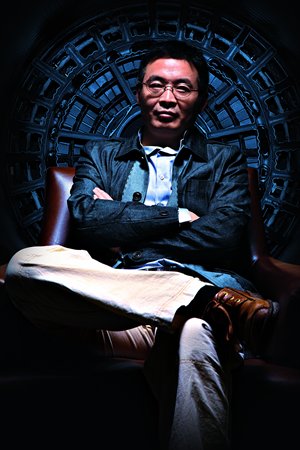Author Decoded

Mai Jia, author of Decoded Photo: courtesy of Mai Jia

The book Decoded by Mai Jia
Over a decade after it was first published in China, best-selling author Mai Jia's maiden work Decoded finally hit Europe and the US on Monday. After winning him numerous awards in China and setting up sales for his follow up novel In the Dark, this novel is now winning him acclaim on an international level.
Decoded but not divulged
The story of Decoded revolves around autistic math genius Rong Jinzhen, whose talent can be traced back to his mathematician grandmother. Wild and introverted, Rong is raised by a missionary until the age of 12 when his natural gift for mathematics is finally recognized. After the discovery, he is brought to live with a mathematics professor and then later hired by a secret national security department called Unit 701 to carry out difficult code-breaking work. At first Rong dedicates himself to his country as an unnamed hero, but eventually succumbs to madness.
The life of this legendary genius draws several parallels with that of Edward Snowden, the computer specialist who revealed US intelligence agency secrets last year. As Mai explained in an interview with The New York Times, "Both Snowden and Rong Jinzhen were abandoned by God."
It took Mai a little over a decade to finish this novel that he first began in 1991 and finished in August 3, 2002. In the book's postscript he recalls how he sent a draft of the book to two different publishing companies, only to receive disappointing rejection letters in return. "At the time it didn't make sense for them to publish a story like this. They also didn't dare publish the book because it seemed to refer to some mysterious department within the government," said Mai. "However, I was actually very cautious when I was writing, making sure to maintain a distance from how these departments actually work. I was really just trying to describe how a genius grows and experiences his life. In the end it's just a novel."
Mai was a soldier for many years, during which time he once interned for a decoding department for eight months.
"The experience gave me a basic idea about how code-breaking staff work, without letting me see too much of the reality of it all. This allowed my imagination to run wild when it came to describing this work," said Mai.
Chance occasion
Mai said he feels it's quite a shame that by the time the first English translation of his novel reaches shelves he will already be 50.
He takes comfort in the fact that at least his Western debut has been backed by two of the West's most reputable publishing companies in the world: Penguin Books and Farrar, Straus and Giroux (FSG). These two publishing houses have implemented an 8-month promotion plan for the book, while mainstream media outlets throughout the world, including The Guardian, The Independent, The Huffington Post and The New York Times have published book reviews about his work.
Mai admits that it was mainly through accident and chance that his novel was able to be published in English at all.
"They really don't know much about Chinese literature," said Mai, explaining that when the editor from FSG first read the English translation of his novel, he couldn't believe it had been written by a Chinese author and was forced to rethink his preconceptions about Chinese writers.
"They have this ingrained notion that Chinese literature is all about rural poverty, political persecution and distorted sex. They don't know that there are many Chinese authors nowadays working on various types of literature," Mai told the Global Times.
The book's translator, Olivia Milburn, was raised in a multilingual British family and studied ancient Chinese at Oxford University. Coming to China for the Shanghai Expo in 2010, she began reading Mai's Decoded and In the Dark in the airport bookstore after her flight had been delayed for three hours.
It was Milburn's family background that first caused the books to catch her eye. Her grandfather was once a cryptographer and had even worked together with the famed Alan Turing, the cryptanalyst who broke the Enigma code during World War II. Noticing the front cover of Mai's books said they were about code-breaking she decided to pick them up and give them a try. After reading them, she decided to translate them into English for her grandfather to enjoy. "She told me she did it purely because she thought that her grandfather would enjoy the story," said Mai.
Not long after, this private translation was read by Julia Lovell, a British expert on Chinese literature who suggested that Milburn send her work to a publishing company. "Lovell once met with me at Peking University and so she knew my books were quite popular in China. She checked to see that no one else was translating my novels, and discovered I had yet to commission any of my works for overseas publishing. After that she recommended Milburn's translation to Penguin Books and that was the start of it all," said Mai.
Flawed destiny
Often referred to as an espionage novelist, Mai doesn't want to be labeled as a genre author.
"I won't write too many stories about code-breaking, otherwise the experience may get too repetitive for readers. They call me an espionage novelist, but I rarely write about war in my books. I actually focus on human beings and their destiny," said Mai.
Like Rong Jinzhen, many of the characters in Mai's books are people working extremely hard to become the top of their field. While this can make for very encouraging stories, these characters also have their fragile side, which leads them to eventually suffer a break down over trivial matters.
"No one is perfect. I feel that these flaws can somewhat be described as fate," explained Mai.